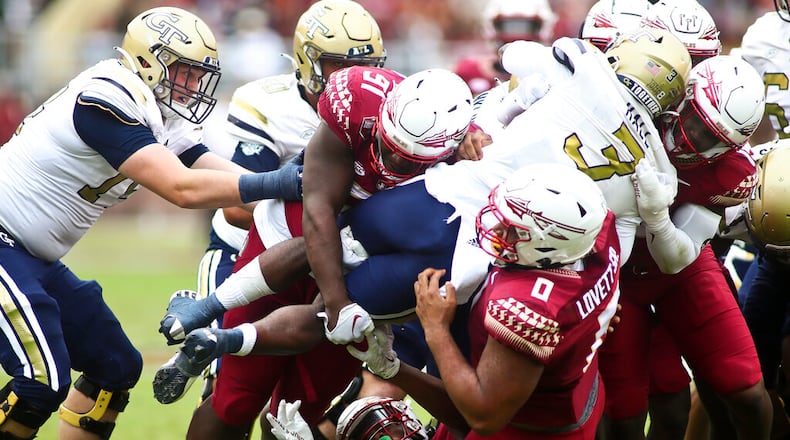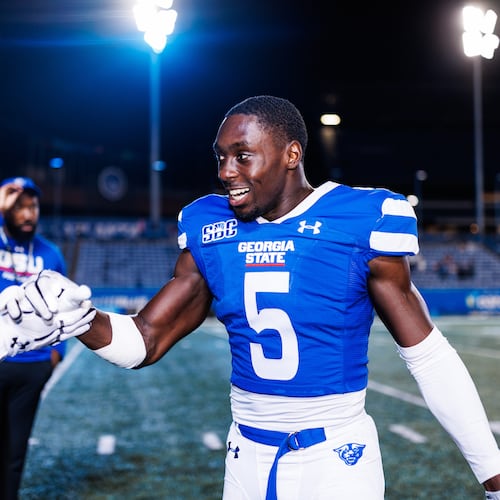There were many puzzle pieces that had to fit in order for Georgia Tech’s 2024 game against Florida State to be moved from Bobby Dodd Stadium to Aviva Stadium in Dublin. The first was put in place in 2016. That’s when the Yellow Jackets were invited to open their season against Boston College in Ireland.
“Their following in that game, they brought more people than Boston College,” Aer Lingus College Football Classic co-founder John Anthony told The Atlanta Journal-Constitution. “We don’t forget things like that.”
Coach Brent Key, Florida State, the ACC, ESPN and, interestingly, the Big Ten and SEC all played a hand in securing the agreement for the game, which will be played Aug. 24. After the news conference last Wednesday, Anthony, ACC senior associate commissioner for football Michael Strickland and Tech athletic director J Batt shared some of the details in how the game came together.
As a game organizer, Anthony has a formula. One trick is to find a team that is willing to give up a conference home game against a team with a sizable fan base likely to make the travel in big numbers to Ireland, with the payoff being a handsome payout and a free trip to Dublin. Many teams aren’t eager to make that trade given the revenues that are generated from home games.
Anthony made it work last year with Northwestern and Nebraska (with the Wildcats trading in their home game) and is highly confident that an SEC team will do likewise. Anthony said that “there’s three SEC schools that aren’t drawing 90,000 that have said they would like to do it.”
However, neither the Big Ten nor the SEC was an option for 2024, as neither conference has yet to make its scheduling model for that year as both are undergoing expansion. That led Anthony to the ACC, which sent Boston College and Tech in 2016 in the first Aer Lingus game.
As he looked at the conference schedule for 2016, one game caught his attention.
“Florida State had told me they were interested in doing it, and when I looked at years and schedules and opponents …” said Anthony, who then made a sound like alarms going off. The ACC new scheduling model was to bring the Seminoles to Bobby Dodd Stadium in 2024.
Not only does Florida State have a fan base likely able to travel en masse to Dublin, but Tech had already proven that it does, too. In 2016, Tech brought more than 12,000 fans to Dublin, larger than the reported estimate of Nebraska’s contingent (10,000). It is a significant factor – the game is an important tourism event for Ireland, as evidenced by an Irish cabinet member and the chief of the Irish consulate in Atlanta both attending the news conference. Organizers are counting on the Tech-FSU game to bring in $74 million to the Irish economy.
“I know that back in Ireland, this announcement will be greeted with much excitement,” said Darragh O’Brien, minister for housing, local government and heritage. “People will welcome it greatly.”
Anthony reached out to Batt last fall, not long after he had been hired, to gauge his interest.
“He grasped it immediately,” Anthony said.
Said Batt, “Obviously, with the combined efforts between the conference and John Anthony and his group and with Florida State, pretty awesome opportunity for our kids primarily but also our fans and alums,” Batt said.
Another reason why Tech could consider giving up one of its four conference home games is that that, while FSU is an appealing matchup from a ticket sales standpoint, the home schedule in 2024 also includes two other name-brand opponents – Clemson and Notre Dame (the latter in Mercedes-Benz Stadium). That should help buffer the loss of FSU from the home slate.
Batt needed the approval of one particularly important member of his staff – Key, who was likely not enthusiastic about giving up home-field advantage in a conference game nor about taking his team on an eight-hour flight to a foreign country to play said game. Anthony got Key on the phone with Northwestern coach Pat Fitzgerald, who answered Key’s questions and allayed concerns.
“It’s something they’ll remember for the rest of their lives,” Key said. “It’s a great opportunity for that. We’re excited.”
The conference office worked through scheduling with both teams with the objective of moving the game to the Saturday before the standard start of the season on Labor Day weekend. Because the 2024 schedule will have two open dates, “there was an option to perhaps play in the traditional Week One, but it made sense for a number of reasons to keep it in Week Zero,” said Strickland, who oversees football for the conference.
Particularly with the extra open date, there is the possibility of rescheduling the Labor Day weekend game – Tech plays Georgia State at Bobby Dodd Stadium in the first-ever football meeting between the neighboring schools – but it appears both Tech and FSU plan to stick with their original Week One plan, Strickland said.
There were also discussions with ESPN, which was on board.
“So we’re really excited about some of the opportunities there that will unfold over the course of next offseason as they ramp up their planning for how they want to promote and cover their game,” Strickland said.
Losing a home game against Florida State is significant – the past two games at Bobby Dodd packed the stadium and produced two of the most memorable wins in team history. But there are other benefits for Tech aside from the opportunity for players, many of whom have never been out of the country, to visit Ireland. (Game organizers offer coaches several options for cultural experiences for the team during their brief stay.)
With the Week Zero game, the Jackets will have three open dates during that season, giving them an advantage in rest. Also, the Florida State game will likely have an unusually large television audience – last year and this year, the Dublin game is the only matchup that week between power conference teams – offering Key and his team a platform they don’t often enjoy.
Last year, the Nebraska-Northwestern game attracted 4.4 million television viewers, according to Sports Media Watch. Tech exceeded that viewership only once last year, and that was another game in which the time slot and opponent (Tech’s Labor Day game against Clemson) served to draw eyeballs. Tech’s second most-watched game (Georgia) had 2.1 million viewers, by measure of Sports Media Watch (The data does not include games on ACC Network, as those are not Nielsen-rated.)
“That’s a pretty great opportunity for Georgia Tech to tell its story, to have your brand, to have your engagement opportunities and to grow who you are and what you’re doing as a global institution,” Anthony said.
To the extent that the oft-repeated adage that the biggest improvement a team makes is between the first and second games is true, it gives Tech a leg up on Georgia State in what Jackets fans surely will consider a must-win game.
The largest pieces are in place. Now all the Jackets have to do is come home from Dublin with a win.
About the Author
Keep Reading
The Latest
Featured


